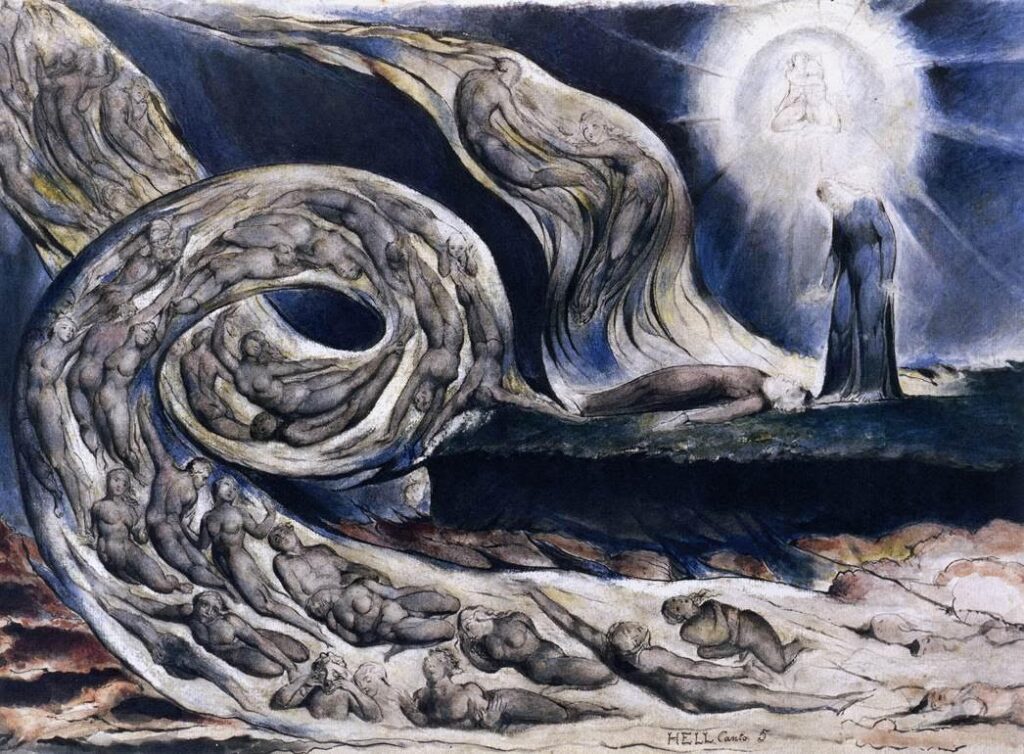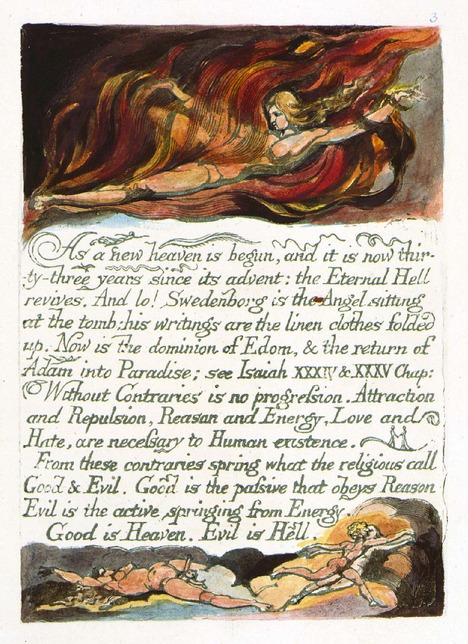The thought of Hericlitus, an obscure Greek philosopher of the 6th century BC, had an influence on William Blake.
Rex Warner included on his website
some of the content of Hericlitus' philosophy. Below each of
Hericlitus' quotes is a passage from Blake which expresses similar or
related sentiments.
Warner writes:
"The following quotations are again from Burnet and I have kept his numbering:
1. It is wise to hearken, not to me, but to my Word, and to confess that all things are one.
ALL RELIGIONS ARE ONE, (E 2) "PRINCIPLE 7th As all men are alike (tho' infinitely various) So
all Religions & as all similars have one source
The true Man is the source he being the Poetic Genius"
4. Eyes and ears are bad witnesses to men if they have souls that understand not their language.
THERE is NO NATURAL RELIGION [b], (E 2)
"I Mans perceptions are not bounded by organs of perception. he
percieves more than sense (tho' ever so acute) can discover." Letters, To Trusler, (E 702)
"Some Scarce see Nature at all But to the Eyes
of the Man of Imagination Nature is Imagination itself. As a man
is So he Sees. As the Eye is formed such are its Powers You
certainly Mistake when you say that the Visions of Fancy are not
be found in This World. To Me This World is all One continued
Vision of Fancy or Imagination & I feel Flatterd when I am told
So."
7. If you do not expect the unexpected, you will not find it; for it is hard to be sought out and difficult.
THERE is NO NATURAL RELIGION [b], (E 2)
"PRINCIPLE 4. As none by traveling over known lands can find out
the unknown. So from already acquired knowledge Man could not
acquire more. therefore an universal Poetic Genius exists"16. The learning of many things teacheth not understanding, else would it have taught Hesiod and Pythagoras, and again Xenophanes and Hekataios.
Vision of Last Judgment, (E 560) "General
Knowledge is Remote Knowledge it is in Particulars that Wisdom
consists & Happiness too."
46. It is the opposite which is good for us.
Milton, Plate 40 [46], (E 12)
"There is a Negation, & there is a Contrary
The Negation must be destroyd to redeem the Contraries
The Negation is the Spectre; the Reasoning Power in Man
This is a false Body: an Incrustation over my Immortal
Spirit; a Selfhood, which must be put off & annihilated alway
To cleanse the Face of my Spirit by Self-examination."61. To God all things are fair and good and right, but men hold some things wrong and some right.
Vision of Last Judgment, (E 554)
"The Last Judgment when all those are Cast away who trouble
Religion with Questions concerning Good & Evil or Eating of the
Tree of those Knowledges or Reasonings which hinder the Vision of
God turning all into a Consuming fire Imaginative Art &
Science & all Intellectual Gifts all the Gifts of the Holy Ghost
are lookd upon as of no use & only Contention
remains to Man then the Last Judgment begins & its Vision is seen
by the [Imaginative Eye] of Every one according to the
situation he holds"71. You will not find the boundaries of soul by travelling in any direction, so deep is the measure of it.
There is No Natural Religion, [b], (E 3)
VII The desire of Man being Infinite the possession is Infinite
& himself Infinite80. I have sought for myself.
Jerusalem, Plate 10, (E 153)
"I must Create a System, or be enslav'd by another Mans
I will not Reason & Compare: my business is to Create"
91a. Thought is common to all.
All Religions Are One, (E 1) "PRINCIPLE. 5. The Religions of all Nations are derived from
each Nations different reception of the Poetic Genius which is
every where call'd the Spirit of Prophecy." 91b. Those who speak with understanding must hold fast to what
is common to all as a city holds fast to its law, and even more
strongly. For all human laws are fed by the one divine law. It prevails
as much as it will, and suffices for all things with something to spare.
All Religions Are One, (E 1) "PRINCIPLE 2d As all men are alike in outward form, So (and
with the same infinite variety) all are alike in the Poetic
Genius"
95. The waking have one common world, but the sleeping turn aside each into a world of his own.
Milton, Plate 27 [29], (E 125) "But in Eternity the Four Arts: Poetry, Painting, Music,
And Architecture which is Science: are the Four Faces of Man.
Not so in Time & Space: there Three are shut out, and only
Science remains thro Mercy: & by means of Science, the Three
Become apparent in time & space, in the Three Professions
Poetry in Religion: Music, Law: Painting, in Physic & Surgery:" __________ Songs and Ballads, (E 501)"You dont believe I wont attempt to make ye
You are asleep I wont attempt to wake ye
Sleep on Sleep on while in your pleasant dreams
Of Reason you may drink of Lifes clear streams
Reason and Newton they are quite two things
For so the Swallow & the Sparrow sings
Reason says Miracle. Newton says Doubt
Aye thats the way to make all Nature out
Doubt Doubt & dont believe without experiment
That is the very thing that Jesus meant
When he said Only Believe Believe & try
Try Try & never mind the Reason why"



